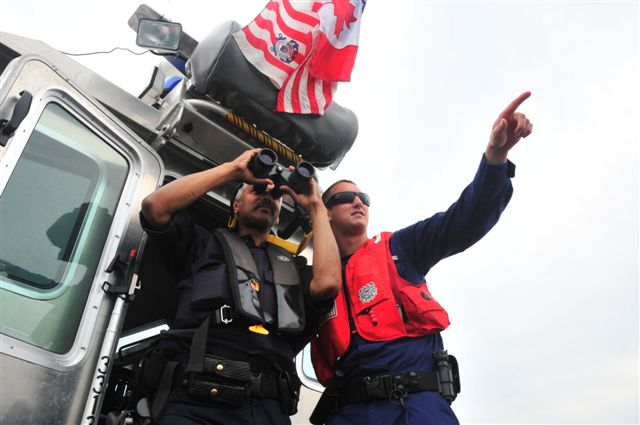Back when Stephen Harper was Prime Minister, he signed a pact with President Obama that made many Canadians uneasy.
The Integrated Cross Border Law Enforcement Operations Act was part of the 2012 omnibus budget package. It allows for American law enforcement agents to cross into Canada and gives, “Every designated officer has the same power to enforce an Act of Parliament as a member of the Royal Canadian Mounted Police.”
The program, called Shiprider, is limited to waterways between Canada and the United States. Law enforcement isn’t supposed to be able to use these powers on land.
But there were plans to expand Shiprider.
Access to these powers on land was supposed come through another program. The plan would extend Canadian law enforcement powers to American officers, included creating new integrated units, focused on areas like crime and intelligence.
According to the Canadian Press, “The next-generation enforcement units were intended to help police strategic points along the 9,000 kilometres of shared Canada-U.S. land border. The project was to be modelled on the Shiprider project, which involves specially trained Canadian and U.S. officers working on the water in dedicated teams.”
In March of this year, journalists found that the pilot projects that were promised never happened. The project was “postponed” due to concerns about which country has jurisdiction if an officer commits a crime, or if a lawsuit were launched.
The law enforcement plans were tied to a 2011 pact between Harper and Obama called Beyond the Border that touched on trade, travellers, deeper economic integration and security. The plan sought to boost cross-border critical infrastructure, share biometric information of people who travel through the border but who are neither Canadian nor American, and, “To plan guidelines on who and what gets to cross the border first following major emergencies like terrorist attacks or natural disasters.”
The plan was estimated to cost Canada $1 billion and has been unrolling ever since.
Part of the Canada-U.S. border is already patrolled from the American side with unarmed Predator Drones. Despite an audit that showed that the drones, operated at a cost of more than $12,000 per hour, didn’t clearly lead to a more secure border, the Americans continued to use them. RCAF officials in 2014 indicated that purchasing drones to operate in Canada was also a priority.
With drones come concerns about information collection and surveillance. And with Harper’s Bill C-51 still on the books, Canadians should be watching how the Trudeau Liberals interact with the new president very closely.
The policies implemented and promoted by Harper still pose many threats. The direction that Harper and Obama took forms a guide for how Trudeau might interact with Trump, if we let him.
Does Trudeau have the strength and conviction to stand up to Trump? This is a critical question, as agreeing to any further measures that allow for U.S. law enforcement to arrest, spy on or otherwise interfere in the lives of people north of the border would be a disaster.
The early signs are not good. The Liberals leveraged broad opposition to C-51 to get elected, and have since sat on their hands rather than implementing their promised changes. And, rather than reflecting the opinions of an overwhelming majority of Canadians, Trudeau congratulated Trump on his victory and even invited the guy to Canada.
“The relationship between our two countries serves as a model for the world. Our shared values, deep cultural ties and strong integrated economies will continue to provide the basis for advancing our strong and prosperous partnership,” Trudeau said.
On a phone call this morning to Trump, Trudeau indicated that he would be “happy” to discuss NAFTA, effectively handing a first victory to Trump (he is now, officially and credibly taking on NAFTA) while sprinkling some Trudeau cheer in his remarks. Workers have been demanding that the Liberals deal with NAFTA for 20 years, and a man elected on a wave of racism and sexism is the one that convinces Trudeau to agree to be “happy” to talk about it?
These are not the words of someone who has the capacity to defend Canada and Canadians from a close-minded and bigoted man like Trump. These words betray that Trudeau either sees no difference in working with a fully-Republican American government than with working with Obama, or his words are so flakey, that they are essentially meaningless.
Either way, Canadians need to watch how the border discussions and economic and political integration unfold. Because, if Trudeau can’t stand up to Trump, or worse, appeases Trump, than Canadians will have a great deal more to be concerned about than watching the American system crumble from afar.
Please chip in to keep stories like these coming.
Image: RCMP




